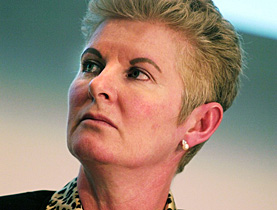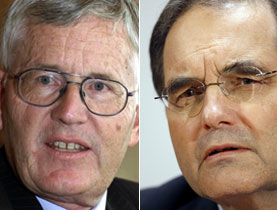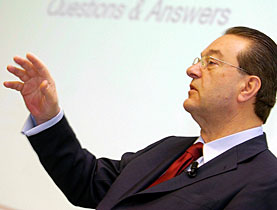UBS nominates finance specialists to boardroom

The round of musical chairs continued at UBS on Monday with the resignation of three board members and the nomination of finance specialists as their replacements.
Switzerland’s largest bank has replaced its chief executive and named a successor as chairman in the last month. Last summer, four directors stood down following the departure of then chairman Marcel Ospel.
Swiss biotech magnate Ernesto Bertarelli, corporate lawyer Gabrielle Kaufmann-Kohler and Asian industry expert Jörg Wolle will step down from the UBS board at the annual general meeting next month.
Shareholders will be asked to vote in Michel Demaré, chief financial officer at Swiss-Swedish engineering firm ABB, former Swiss Re CFO Ann Godbehere and Zurich Financial Services chief risk officer Axel Lehmann.
Godbehere has recently completed a successful stint as CFO of troubled British bank Northern Rock. She was drafted in by the British government a year ago to help stabilise the crippled financial institution.
Focussing boardroom experience
“I am very excited that we can propose three exceptionally well-qualified candidates for election to the board of directors,” outgoing UBS chairman Peter Kurer said in a statement.
“They each have specific banking, finance and risk experience, allowing them to contribute to the various committees it is planned they join.”
The bank’s share price rose more than eight per cent by midday as investors took stock of the news.
The introduction of three nominated specialists in the field of finance and risk follows a year-long debate on the merits and pitfalls of having a boardroom full of diversified talent from different industries.
Some commentators had laid part of the blame for the bank’s disastrous strategy on the lack of banking knowledge among the people responsible for setting the right course.
The bank has also addressed criticism of a perceived blurring of the lines between the board and the executive by reforming the chairman’s role and limiting the tenure of boardroom members to one year before a new shareholder vote was triggered.
Increased demand of role
Bertarelli, who became a billionaire after taking over and selling the family biotech firm Serono, was a UBS board veteran of seven years. Wolle and Kaufmann-Kolle have served three years each.
“I am proud to have served one of Switzerland’s most important corporations during seven years, and through one of its most challenging periods,” said Bertarelli. “Now it is appropriate that other people join the board to participate in this transformation process towards bringing UBS AG back to its leadership position in the world of banking.”
Kaufmann-Kolle said the ongoing dispute between the bank and the United States authorities over tax evasion conflicted with her day job as international legal arbiter. Wolle said the increased workload of his UBS role clashed with the demands of leading a business consultancy firm.
“UBS has important challenges ahead and therefore the Swiss banking giant needs outstanding people to tackle them,” said analyst Nicolas Michellod at the Celent insurance practice group. He praised the choice of Lehmann because he had helped Zurich Financial Services weather the financial crisis “without big problems”.
Former Credit Suisse chief executive Oswald Grübel replaced UBS CEO Marcel Rohner at the end of February while chairman Kurer announced a week later that he would step down from the role in April.
Former Swiss Finance Minister Kaspar Villiger has been lined up to replace Kurer.
swissinfo with agencies
UBS’s dramatic fall from grace started in July 2007, when chief executive Peter Wuffli stepped down following the collapse of the bank’s hedge fund Dillon Read Capital Management.
In October 2007, UBS said it would cut 1,500 jobs in its investment banking arm, including that of its head, Huw Jenkins. Chief Financial Officer Clive Standish left at the same time. Chairman Marcel Ospel stepped down in April 2008.
In October last year, the Swiss National Bank (SNB) was forced to inject SFr6 billion ($5.29 billion) into UBS. A facility was also set up to allow the bank to bin up to $60 billion of toxic assets.
This bailout did not prevent the bank from posting a SFr20 billion loss for 2008. Wealthy clients pulled out $58 billion from the bank in the last quarter alone.
UBS has also been haunted by a US investigation that accused the bank of helping wealthy Americans illegally evade $200 billion in taxes. Last week, it was forced to pay $780 million in fines and hand over some confidential client data.
In February 2009, UBS chief executive Marcel Rohner announced he would step down, to be replaced by former Credit Suisse CEO Oswald Grübel.
A week later, chairman Peter Kurer said he would step down, with former Swiss cabinet minister Kaspar Villiger nominated to replace him.

In compliance with the JTI standards
More: SWI swissinfo.ch certified by the Journalism Trust Initiative



You can find an overview of ongoing debates with our journalists here . Please join us!
If you want to start a conversation about a topic raised in this article or want to report factual errors, email us at english@swissinfo.ch.